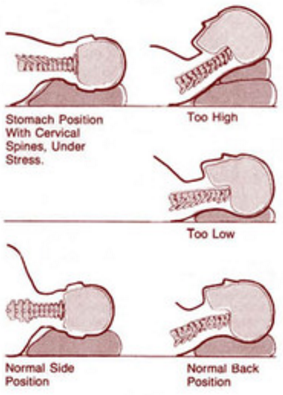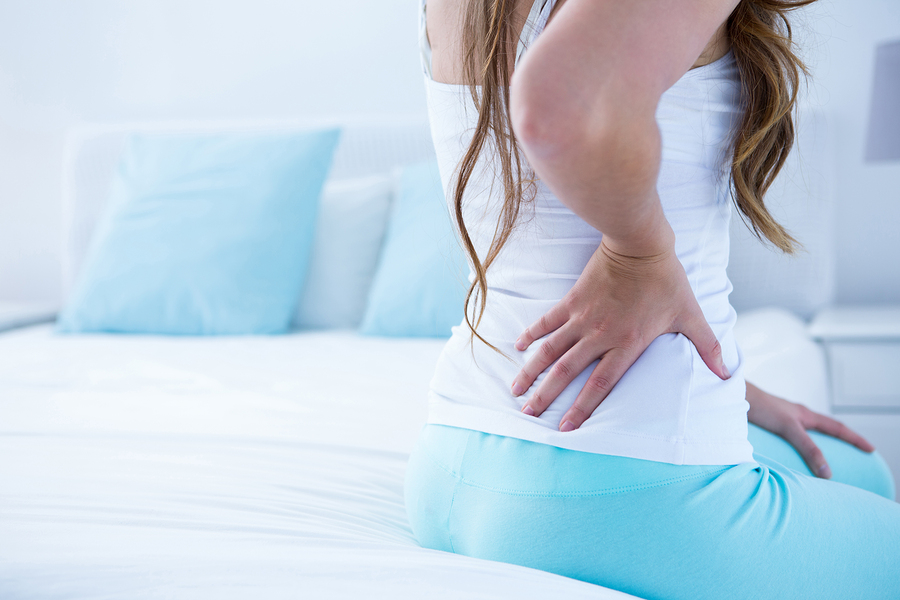Hey everyone, Dr. Lell here from not-so-sunny Portland. Though I have to admit, the days are getting a little longer, finally. It’s nice to be able to walk around Sellwood when I leave the clinic and still have some daylight to guide my steps. One thing that these darker days we’ve had brings is more sleep. It’s normal to sleep more during the winter months. The sun goes down earlier, our internal clocks kick in, and we’re in bed for 8:30. The increased mattress time for some folks can lead to more morning low back pain and stiffness than what they originally had. Some people have low back in the morning all the time; and that’s what this post it about. I’m answering the question “Hey Dr. Lell – why does my back hurt more in the morning?”
In most people, it’s from one of three things: an unhappy lumbar disc, a crappy night’s sleep, or arthritis.
1 – Morning Back Pain from a Lumbar Disc
People with discogenic low back pain (derangement, herniated disc, bulging disc) will often feel worse in the morning because of the hydrodynamic properties of the lumbar disc. The center of the disc is this water grabbing jelly. As the day goes on, your movements and your weight against gravity will compress the disc removing excess fluid. This takes some of the pressure off the pain sensitive outer-covering and neighboring muscles and nerves. During the night when you’re on your back, gravity is taken out of the equation (relatively) and your discs reabsorb some water making them a little larger by the time you wake up. That increased size can lead to reactionary muscle tightness, soreness, etc.
What are some other signs that you might have discogenic low back issue (outside of pain)? Chronically tight hamstrings, difficulty getting out of a chair or car, and back pain with certain motions are a few examples.
2 – Morning Back Pain from a Bad Night’s Sleep
Your back has these natural curves; directions they want to go in and where mechanical pressures and stresses are evenly distributed. Poor sleeping postures or a bad mattress can stress your spine in the wrong directions. When you sleep, the muscles that keep everything together and “in-line” are relaxed and this leaves your spine to rest on their ligaments. The body doesn’t like this very much and it’s natural reaction is to tighten up area musculature. Poor sleeping postures (on your side with a slanted hip, your stomach, etc.) work on the same principle. The best way to figure out if your mattress is causing your morning low back pain is to sleep on something else for a night. If you wake up refreshed and better, then it’s time for a new mattress. There are a lot of options out there but a guy who owned a few mattress stores in Portland and Oregon City once told me that the differences between them are just marketing. You can pretty much pick one at random and be fine.


3 – Morning Back Pain from Arthritis
One of the hallmark symptoms of arthritis (AKA Degenerative Joint Disease, DJD, and Osteoarthritis, OA) is morning stiffness that lasts for an hour or so until you get “warmed up” and moving. Arthritis is an inflammatory process and the swelling can occur overnight (swelling is a key part of inflammation). Unlike what we mentioned before, the swelling in OA occurs in the joint spaces – not within the disc. Either the synovium (joint covering) or the synovial fluid can increase in space/volume. The inflammatory process draws in more liquids and the lack of movement (because you’re sleeping) keeps them from getting pushed out sooner. DJD is a common problem, especially in older people, but that doesn’t mean it should be taken lightly. DJD is a disease process that usually only worsens and should be managed (because there is no cure) to ensure proper motion, function, and quality of life can be maintained throughout the years.
If you’ve been dealing with low back stiffness, make an appointment. Get it figured out, and start getting better. The morning is a fresh start to a new day; don’t begin it in pain.
As always, if you have a question, comment, or a request – drop me a line on Facebook! Until then, remember to eat well and move often.
Yours in good health,
Dr. Lell
Questions about this post?
Dr. Lell would be happy to answer questions or provide more information discussed in this blog post. Contact him through our Contact Page.
